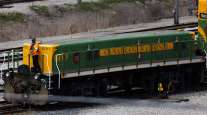Senior Reporter
Proposed Merger Dominates CN Financial Report

[Stay on top of transportation news: Get TTNews in your inbox.]
Canadian National Railway reported an increase in second-quarter net income and revenue, and for the second period in a row company leaders spent significant time detailing for analysts the value of the company’s $33.7 billion merger with Kansas City Southern.
Canadian National on July 20 posted net income of C$1.03 billion, or C$1.46 a share, compared with C$545 million, C$.77, a year ago.
Revenue for the Montreal-based railroad was C$3.59 billion, a 12.1% improvement over last year’s C$3.21 billion.
The pro-competitive CN-KCS combination will enhance route choice and provide all market participants, railroads, and shippers a fair chance to compete. Read about the benefits of the transaction and see more important info: https://t.co/BSY4zRJ6Vw #ConnectedContinent — Canadian National (@CNRailway) July 9, 2021
Also discussed at length was the executive order President Joe Biden signed July 9 to curb abuses of pricing power in consolidated industries. The order targets a variety of industries, going well beyond the concerns some in Congress have over consolidation in the technology sector to look at traditional industries from agriculture to banks to transportation, including railroads.
Seven major railroads dominate North America, each in a geographic region, raising concerns among shippers about competition.
On a conference call with analysts after the earnings announcement, CN officials again touted the benefits of connecting the United States, Canada and Mexico with one merged railroad and moving some freight away from trucking. Kansas City Southern is the only North American freight railroad that operates deep into Mexico.
With the new free trade agreement for Canada, Mexico and the United States, railroad officials said they could move more freight at a lower cost.

Ruest
“We’re very confident we have a very solid case,” said JJ Ruest, the CEO of CN. “Our proposed combination with Kansas City Southern has received overwhelming support from a broad base of stakeholders because it will enhance competition and drive economic growth in North America. We are confident in our ability to obtain the necessary approvals and successfully close this pro-competitive combination and look forward to delivering the many compelling benefits to customers, employees, labor partners and the communities in which we operate.”
However, the new executive order may present another hurdle. The White House wants public interest consideration, calling on the Surface Transportation Board to look at how railroads regard Amtrak passenger trains’ priority right-of-way on tracks the freight rail and passenger lines share.
Transportation economist Paul Bingham with IHS Markit said the passenger rail access issue could be something the STB looks at later this year.
“I’ve been trying to read between the lines for what the implications are for freight rail, network track access for Amtrak, which I believe the president is most interested in,” Bingham said.
During his 36 years in the Senate, and occasionally as vice president, Biden rode Amtrak regularly between Washington, D.C., and his home in Delaware.
To keep our country moving, we have to bring fair competition back to this economy. That’s why today, I’m signing an Executive Order promoting competition.
It’ll lower prices, increase wages, and take another critical step toward an economy that works for everyone. — President Biden (@POTUS) July 9, 2021
CN’s quarterly results came as it awaits an STB decision on its application to establish a voting trust for its KCS takeover bid as its merger proposal is analyzed by the regulator.
A voting trust is a legal trust created to combine the voting power of shareholders by temporarily transferring their shares to the trustee, in this case, CN. In exchange for their shares, KCS shareholders would receive certificates indicating they are beneficiaries of the trust.
If the STB rejects the voting trust, CN could be on the hook for a lot of money, including $1 billion in a penalty and another $700 million it would have to pay KCS to reimburse the railroad.
KCS has already paid rival Canadian Pacific that amount after KCS backed away in May from a deal it had with Canadian Pacific Railway.
Across its various freight divisions, CN said petroleum and chemical shipments saw revenue increase 28% to C$685 million from C$585 million in 2020.
Metals and minerals rose 34% to C$377 million from C$308 million.
Forest products increased 9% to C$451 million from C$413 million.
Coal rose 13% to C$158 million from C$140 million.
Intermodal revenue jumped 19% to C$1.037 billion from C$874 billion.
Automotive shipment revenue was up 96% to C$135 million from C$69 million.
Only revenue from grain and fertilizer shipments saw a year-over-year decrease, dropping 6% to C$609 million from C$649 million.
CN has had two tough quarters when it comes to the weather and natural disasters. It battled bitter cold and snow across its network during the winter months, which impacted its operating ratio. But in the second quarter, the Class I railroad battled operational issues caused by wildfires in parts of British Columbia. Still, the railroad’s operating ratio improved to 61.6 compared to 75.5 in the same period last year.
Operating ratio, or operating expenses as a percentage of revenue, is used to measure efficiency. The lower the ratio, the higher the company’s ability to generate profit.
Canadian National ranks No. 19 on the Transport Topics Top 50 Global Freight carriers list.
Want more news? Listen to today's daily briefing below or go here for more info:




